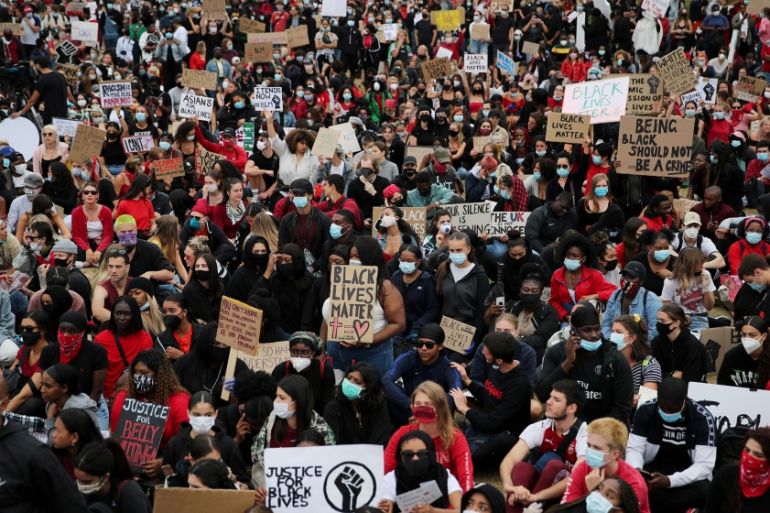George Floyd: UN rights boss slams ‘structural racism’ in US
Michelle Bachelet says US must address ‘deep-seated’ grievances at heart of protests following George Floyd’s killing.

The United Nations rights chief has criticised “structural racism” in the United States, urging the country’s leaders to “condemn racism unequivocally” and address the “deep-seated” grievances at the heart of the protests that have broken out in hundreds of cities following the police killing of another Black man.
George Floyd died on May 25 after being pinned to the ground by a white police officer in Minneapolis, Minnesota. The officer knelt on Floyd’s neck for nearly nine minutes, even as the unarmed Black man pleaded “I can’t breathe”.
Keep reading
list of 3 itemsOver 9,000 arrested as Floyd protests continue: Live Updates
In Pictures: Protesters teargassed for Trump photo-op
Most of the demonstrations that have since spread across the US to denounce police racism have been peaceful. And while there have also been incidents of violence, some officers have been accused of making things worse by employing aggressive tactics that have prompted further allegations of brutality.
In a statement on Wednesday, UN High Commissioner for Human Rights Michelle Bachelet cited “credible reports of unnecessary and disproportionate use of force” by US law enforcement officers, including ammunition, tear gas, rubber bullets and pepper balls.
“The voices calling for an end to the killings of unarmed African Americans need to be heard. The voices calling for an end to police violence need to be heard. And the voices calling for an end to the endemic and structural racism that blights US society need to be heard,” she said.
It came as US President Donald Trump rejected criticism over his use of force to break up a peaceful rally in Washington, DC and pledged to order a military crackdown on protests.
Bachelet stressed the need for clear and constructive leadership at this time.
“Especially during a crisis, a country needs its leaders to condemn racism unequivocally; for them to reflect on what has driven people to boiling point; to listen and learn; and to take actions that truly tackle inequalities,” she said.
|
|
Attacks against journalists
The top UN official voiced particular alarm at reports that at least 200 journalists had been attacked or arrested while covering the protests, despite their press credentials being clearly visible.
“What has been happening is an unprecedented assault on journalists,” she said, pointing out that “in some cases, they have been attacked or even arrested while on air”.
“It is all the more shocking given that freedom of expression and of the media are fundamental principles in the US, central to the country’s identity,” she added. “Reporters must be able to do their important work free from attacks or repression.”
Bachelet also expressed deep concerns at statements that have sought to label protesters as “terrorists” or to delegitimise the mass outpouring of grief and peaceful rallies by pointing to violence or destruction of property that has occurred in many locations.
“There can be no doubt as to what or who is ‘behind’ these protests. We have seen thousands upon thousands of peaceful protesters, of diverse backgrounds, taking to the streets to demand their rights and to call for change,” she said.
Bachelet repeated calls to protesters to express their demands for justice peacefully and for the police to take the utmost care not to inflame the situation through excessive force.